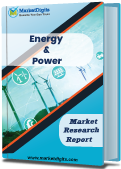- Home
- Energy & Power
-
Ai In Fuel Market

Global AI in Fuel Market by Function(Predictive Maintenance and Machinery Inspection, Material Movement), Application(Upstream, Downstream) Type(Hardware, Software) - Partner & Customer Ecosystem (Product Services, Proposition & Key Features) Competitive Index & Regional Footprints by MarketDigits - Forecast 2024 – 2032
Industry : Energy & Power | Pages : 187 Pages | Upcoming : Jun 2024
The global AI in Fuel Market had a value of USD 2.32 billion in 2021 and is projected to reach USD 5.32 billion by 2030, growing at a CAGR of 8.76% during the forecast period (2023-2030). Artificial intelligence (AI) is a rapidly growing technology with immense potential for growth and innovation. It has already brought significant changes and disrupted competition across various sectors, including manufacturing, healthcare, transportation, retail, media, and finance.
AI is also being utilized to optimize the fuel supply chain, enabling improvements in inventory control, waste reduction, and delivery efficiency. Price forecasting is another area where AI is making an impact by assisting companies in making better purchasing and pricing decisions, leading to increased profits and a stronger market position.
Real-time fuel quality data analysis is facilitated by AI, enabling the identification of potential issues such as contamination or low-quality fuel. Additionally, AI optimizes fuel production and distribution processes, helping businesses address problems proactively, reducing the likelihood of liability and reputation damage.
US AI in Fuel Market is poised to grow at a sustainable CAGR for the next forecast year.
Furthermore, AI is employed to optimize fuel production processes, aiming to reduce emissions and improve environmental impact. By analyzing manufacturing process data, AI systems identify opportunities to minimize waste and enhance efficiency, resulting in lower emissions and more sustainable operations.
Global AI In Fuel Market Segmental Analysis
The Global AI in Fuel Market is segmented based on Type (Hardware, Software, Services), Function (Predictive Maintenance and Machinery Inspection, Material Movement, Production Planning, Field Services, Quality Control, Reclamation), Application (Upstream, Downstream, Midstream), and region (North America, Europe, Asia-Pacific, South America, MEA).
Analysis by Function
The predictive maintenance and machinery inspection segment is projected to grow at the fastest CAGR of 8.87% during the forecast period. Predictive maintenance is a crucial area that helps manage costly downtime by predicting maintenance schedules and avoiding equipment failures, resulting in significant cost savings.
Analysis by Application
In 2021, the upstream segment held the highest revenue share in the AI in Fuel Market. This segment involves the exploration of potential reserves of raw natural gas and crude oil underground or underwater, including the drilling of test wells to extract these resources to the surface.
Global AI In Fuel Market Regional Insights
In terms of fuel production quantity, North America has emerged as the largest global market, aided by the widespread use of artificial intelligence in various fields and processes involved in fuel manufacturing. The region's demand for AI is expected to be driven by factors such as a strong economy, high adoption of AI technologies among oilfield operators and service providers, a significant presence of leading AI software and system suppliers, and combined investments from the government and private sectors to foster research and development activities.
However, the Asia-Pacific region is projected to experience the highest growth in the AI in Fuel market in the coming years, driven by the region's increasing demand for fuel due to the rise in passenger cars.
Global AI in Fuel Market Dynamics
Drivers
Increasing energy demand
• The global energy demand is rising, and the fuel industry faces the challenge of meeting this demand. AI can assist fuel companies in optimizing their operations and reducing costs, enabling them to meet the growing demand while maintaining profitability.
Technological advancements
• The rapid development of technologies such as machine learning, natural language processing, and computer vision is propelling the global AI in Fuel market. These advancements are helping the fuel industry automate tasks, enhance decision-making, and reduce human error.
Rising awareness of climate change
• There is a growing recognition of the need to reduce greenhouse gas emissions and transition to cleaner, more sustainable energy sources. AI can aid fuel companies in transitioning to cleaner energy sources while ensuring profitability.
Restraints
High implementation costs
• Implementing AI technology in the fuel industry can be expensive, especially for small and medium-sized businesses. The high implementation costs may deter some companies from adopting AI, leading to slower market growth.
Data quality and availability
• AI systems require large amounts of high-quality data to function effectively. However, the fuel industry may face challenges in accessing such data or encounter data of poor quality, limiting the effectiveness of AI solutions.
Lack of skilled labor
• The development and implementation of AI technology require a highly skilled workforce. There may be a shortage of professionals with the necessary skills and expertise to implement and manage AI systems in the fuel industry.
Global AI In Fuel Market Competitive Landscape
Apart from well-established players, numerous startups and emerging companies are entering the market with innovative AI-based solutions for the fuel industry. These firms leverage the latest advancements in AI technology to develop solutions that optimize operations, reduce costs, and enhance the customer experience for fuel companies. The AI in Fuel market is highly competitive, with companies striving to differentiate themselves by offering unique and innovative solutions. Collaboration among companies to develop new technologies and solutions is also becoming increasingly common through partnerships and collaborations.
Top Player’s Company Profiles
• Accenture plc
• C3.AI
• Cisco Systems, Inc.
• Cloudera, Inc.
• FuGenX Technologies Pvt. Ltd
• Google LLC
• Huawei Technologies Co. Ltd
• IBM
• Infosys Limited
• Intel Corporation
• Microsoft Corporation
• Neudax
• NVIDIA Corporation
• Oracle
• Shell plc.
Recent Developments
• In June 2022, AIQ, a joint venture of Adnoc and Group 42, collaborated with Abu Dhabi's Hub71 to research new AI solutions for the fuel industry. This partnership aims to develop advanced digital technologies that maximize the value of fuel operations and contribute to the sustainability of the energy sector.
• In February 2022, Windward, a predictive intelligence company, partnered with Avni International, an independent tanker operator in the crude oil and petroleum shipment sector, to utilize AI in global maritime trade. Windward's AI-powered platform enhances sanctions compliance programs, screens vessels, and assesses maritime traffic and port congestion to optimize tank operations. The platform utilizes real-time analysis of factors such as vessel behaviors, ownership structures, and company risks.
Global AI In Fuel Key Market Trends
• The substantial growth in the global fuel industry is creating a positive outlook for the AI in Fuel market. AI tools facilitate the automation of geological data analysis, digitization of records, and identification of issues such as equipment usage and pipeline corrosion. Additionally, the adoption of AI solutions for toxicity level monitoring, leak detection, and automatic adjustment of cooling and heating systems is driving market growth. Integration of machine learning (ML) with AI to efficiently solve complex problems is also contributing to market growth.
• There is a rising demand for advanced solutions in drilling, boiler diagnostics, quality control, planning, and predictive maintenance across various operations, fueling market growth. Other factors expected to drive the market include increasing demand among oilfield operators, government initiatives to reduce the environmental impact of energy production, and extensive research and development (R&D) activities.
TOC
Table and Figures
Methodology:
At MarketDigits, we take immense pride in our 360° Research Methodology, which serves as the cornerstone of our research process. It represents a rigorous and comprehensive approach that goes beyond traditional methods to provide a holistic understanding of industry dynamics.
This methodology is built upon the integration of all seven research methodologies developed by MarketDigits, a renowned global research and consulting firm. By leveraging the collective strength of these methodologies, we are able to deliver a 360° view of the challenges, trends, and issues impacting your industry.
The first step of our 360° Research Methodology™ involves conducting extensive primary research, which involves gathering first-hand information through interviews, surveys, and interactions with industry experts, key stakeholders, and market participants. This approach enables us to gather valuable insights and perspectives directly from the source.
Secondary research is another crucial component of our methodology. It involves a deep dive into various data sources, including industry reports, market databases, scholarly articles, and regulatory documents. This helps us gather a wide range of information, validate findings, and provide a comprehensive understanding of the industry landscape.
Furthermore, our methodology incorporates technology-based research techniques, such as data mining, text analytics, and predictive modelling, to uncover hidden patterns, correlations, and trends within the data. This data-driven approach enhances the accuracy and reliability of our analysis, enabling us to make informed and actionable recommendations.
In addition, our analysts bring their industry expertise and domain knowledge to bear on the research process. Their deep understanding of market dynamics, emerging trends, and future prospects allows for insightful interpretation of the data and identification of strategic opportunities.
To ensure the highest level of quality and reliability, our research process undergoes rigorous validation and verification. This includes cross-referencing and triangulation of data from multiple sources, as well as peer reviews and expert consultations.
The result of our 360° Research Methodology is a comprehensive and robust research report that empowers you to make well-informed business decisions. It provides a panoramic view of the industry landscape, helping you navigate challenges, seize opportunities, and stay ahead of the competition.
In summary, our 360° Research Methodology is designed to provide you with a deep understanding of your industry by integrating various research techniques, industry expertise, and data-driven analysis. It ensures that every business decision you make is based on a well-triangulated and comprehensive research experience.
• Product Planning Strategy
• New Product Stratergy
• Expanded Research Scope
• Comprehensive Research
• Strategic Consulting
• Provocative and pragmatic
• Accelerate Revenue & Growth
• Evaluate the competitive landscape
• Optimize your partner network
• Analyzing industries
• Mapping trends
• Strategizing growth
• Implementing plans
Covered Key Topics
Growth Opportunities
Market Growth Drivers
Leading Market Players
Company Market Share
Market Size and Growth Rate
Market Trend and Technological
Research Assistance
We will be happy to help you find what you need. Please call us or write to us:
+1 510-730-3200 (USA Number)
Email: sales@marketdigits.com







